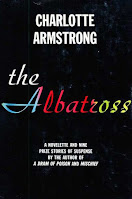This
story was first serialized as a short story in McCall’s magazine in August
1957. It was the title of a book published that same year. The book was a
collection of short stories with The
Albatross the lead story, as it occupies about 100 pages while the other
ten stories run from about 15 to 20 pages.
It
was produced for a CBS series, Climax,
as a live TV broadcast at the same time. In 2006, it was also produced as
a DVD in Japan (as The Visitor in Black)
which followed a release as a TV movie in that country in 2001. The print
version was very popular in Japan which led us to wonder why. We think the
answer lies in the title.
Albatross came to mean a “seemingly inescapable moral or emotional burden, as
of guilt or responsibility”[1].
That meaning is derived from the famous Samuel Taylor Coleridge poem, The Rime of the Ancient Mariner, in
which a boat crew member shoots an albatross, ignoring the legend that an
albatross circling a boat is a sign of good luck. Over time the bad connotation
of the work has outlived the good.
The
storyline is that in a roadside Santa
Clara motel, Esther Gardner wakes up to an intruder lurching toward her. No one
blames her husband, Tom, for taking him down with a single blow to the
head—least of all the stranger himself, an embarrassed real estate broker from
Arcadia, who had drunkenly stumbled into the wrong room.
Three days later, the poor man dies of a neglected head injury, leaving his
wife, Audrey, and her invalid sister penniless, desperate, and in need of a new
home. Overcome with guilt, Tom and Esther invite the women to stay with them.
But as the temporary stay stretches into months, Esther can’t shake the
disquieting suspicion that their grieving, freeloading guests are up to
something.
The sisters’ whispers are starting to sound conspiratorial. Their stories
aren’t adding up and their smiles are beginning to curl with menace. If it’s
all in Esther’s over-burdened imagination, that would be understandable. If it
isn’t, that could be terrifying.[2]
Therefore,
we conclude that the meaning is that serious guilt can arise from surprising
events. Honor is very important to Japanese culture.
Personal
note: I watched the whole TV production on tape. It had no English subtitles,
so I ran it in fast-forward, and from the video, I could conclude that the film
followed the story quite well as the bad guy got his comeuppance but in a
totally different fashion than in the book.
The story was reprinted as a paperback under the title, Mask of Evil. We believe the original title has a lot more meaning than any of the other choices.

No comments:
Post a Comment